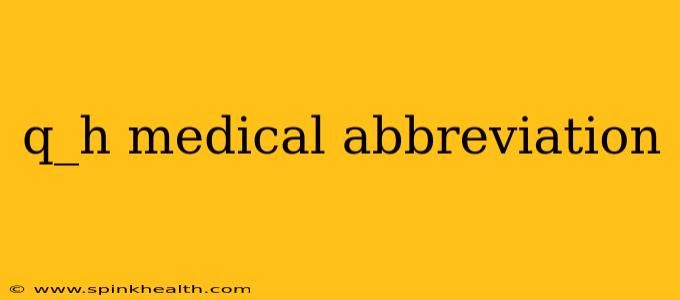The medical world is filled with abbreviations, a shorthand language born from necessity and efficiency. One such abbreviation that can cause confusion is "qh." Let's unravel the mystery behind this seemingly simple term and explore its implications in healthcare.
For those unfamiliar, "qh" is a medical abbreviation that used to stand for "quaque hora," a Latin phrase meaning "every hour." However, the use of "qh" is strongly discouraged and considered unsafe in modern medical practice. Why? Because the frequency of medication administration is crucial for patient safety and efficacy, and "qh" leaves too much room for misinterpretation and potential errors.
Why is "qh" no longer used?
The primary reason for the phasing out of "qh" is the risk of medication errors. Imagine a nurse misinterpreting the order, leading to an overdose or missed dose. This risk significantly outweighs any convenience the abbreviation offered. The potential consequences can range from mild discomfort to life-threatening situations.
What are the alternatives to "qh"?
Modern medical practice emphasizes clarity and precision. Instead of "qh," healthcare professionals now use unambiguous instructions. This usually involves specifying the exact dosing schedule, such as:
- Every hour for the first 8 hours, then every 2 hours.
- One tablet every hour while awake.
- 10mg every hour as needed for pain.
This level of detail minimizes ambiguity and ensures accurate medication administration.
What about other similar abbreviations?
The concern surrounding "qh" extends to other potentially ambiguous abbreviations. The Joint Commission, a leading healthcare accrediting body, has published a list of abbreviations to avoid to improve patient safety. This list consistently emphasizes the importance of clear and unambiguous communication.
Is there ever a situation where "qh" might be used?
While discouraged and rarely, if ever, used in official medical documentation, you might encounter "qh" in older medical records or less formal notes. It is important to treat such instances with caution and verify the intended meaning with a healthcare professional if there is any doubt.
Frequently Asked Questions about "qh"
Here are some commonly asked questions about the "qh" medical abbreviation:
What does qh mean in medical terms?
Historically, "qh" meant "every hour" (quaque hora in Latin), but it's no longer recommended for use due to the risk of medication errors. Modern practice demands more precise dosing instructions.
Is qh safe to use?
No. The use of "qh" is strongly discouraged due to the potential for misinterpretation and consequent medical errors. The risk of harm to the patient far outweighs any perceived convenience of using this abbreviation.
What should I do if I see "qh" in a medical chart?
If you encounter "qh" in a medical chart or prescription, seek clarification from a healthcare professional immediately. Don't rely on its historical meaning; ensure a clear understanding of the intended dosing schedule to avoid potential errors.
In conclusion, while "qh" might be familiar to some, its use is outdated and unsafe. The emphasis on clear communication and precision in healthcare requires abandoning ambiguous abbreviations to ensure patient safety and well-being. Precise instructions are paramount, leaving no room for misinterpretation or errors. Remember, clarity saves lives.

